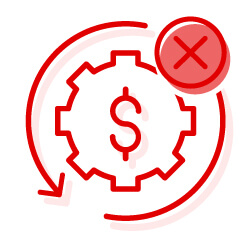There May be an End in Sight to COVID-19, but Chargeback Troubles Will Drag On
Few verticals felt the pain of the COVID-19 shutdowns as acutely as the travel industry. According to the International Air Transport Association (IATA), governments around the world provided approximately $173 billion in financial support to airlines during 2020. Despite that aid, many airlines and OTAs are still struggling to maintain a healthy financial position.

- Temporary waivers or suspensions of taxes and fees to help reduce flight costs and incentivize travel.
- Subsidies for certain routes to make broader connectivity more financially feasible.
- Financial subsidies for operating flights despite low yields.
- Advanced ticket purchases that governments can distribute as vouchers to support tourism.
- Direct subsidies to travelers to encourage wider usage of airlines.
These tactics would provide a financial stimulus for the travel industry. However, we also need to look at methods that can help businesses protect whatever revenue they manage to take in.
Chargebacks Threatening Airlines & OTAs
Chargebacks were already a problem in the travel space before the pandemic. Since the outbreak of COVID-19, though, they’ve become a substantial hurdle for merchants, as well as the financial institutions who work with them.
According to our data, the travel industry accounted for roughly 1 in 8 chargebacks issued in 2019. That was pre-pandemic; although firm numbers are hard to identify at this stage, the number of chargeback issuances in the travel industry in 2020 was substantially higher than the previous year.
[Tweet "1 in 8 chargebacks filed by cardholders in 2019 were in the travel industry."]The situation is not as dire now as in Spring 2020 when lockdowns were first rolling out. With the effects of COVID-19 still lingering, however, merchants across the travel space are having trouble keeping chargeback issuances down. To make matters worse, the chargeback threat has become a compounding problem that ripples throughout the industry.
We watched as several iconic travel brands went under following the COVID-19 outbreak. In each case, travelers—often thousands of them—found themselves with plans abruptly canceled. Since bankrupt companies were in no position to offer refunds, customers were instructed to file a dispute with their issuing bank.
While this is a legitimate use of the chargeback process, it has the side effect of normalizing chargeback requests in the travel space. This opens the door for abuse going forward.
Fraudulent chargeback issuances—commonly known as friendly fraud—are up 41% since the start of the pandemic across all verticals. The hardest-hit industry was travel; the same report finds that 41% of all merchants in the travel industry reported that COVID-19 had a “negative” or “very negative” impact on their operations.
Chargebacks Lead to Travel Industry Pain.
Want to relieve the pressure? Find out what Chargebacks911® can do for you.

Chargeback Losses Aren’t Letting Up
Customers are getting more comfortable with the prospect of demanding chargebacks. Even once the COVID-19 crisis is finally behind us, it’s likely that consumers will engage in friendly fraud more often than before.
This is bad news for the travel space in the mid-to-long-term. Each chargeback results in:
Even worse, chargebacks can add up over time. Each filed impacts the merchant’s chargeback-to-transaction ratio. If this figure surpasses acceptable thresholds, the merchant’s ability to accept card transactions could be frozen, or canceled entirely. And, while card networks like Visa and Mastercard have offered some relief for travel merchants, the threat posed by chargebacks still looms over the industry.
Leisure travel isn’t expected to recover until 2022, at the earliest. In the meantime, airlines and online travel agencies (OTAs) have to focus their attention on safeguarding their revenue. They should also look ahead and plan how to meet the friendly fraud challenges just over the horizon.
Open Communication Can Eliminate Some Chargebacks
First, we have to drive home the importance of clear, effective communication.
Maintaining open lines of communication makes it much easier to separate legitimate disputes from illegitimate ones. In most cases, cardholders aren’t looking to try and get something for free at a merchant’s expense: they’re confused, and simply want to get their money back. Merchants who communicate effectively with customers and reassure them about the process are much less likely to see chargebacks.
[Tweet "Merchants who communicate effectively with customers and reassure them about the process are much less likely to see chargebacks."]This extends to financial institutions as well. Alerts services and programs like Rapid Dispute Resolution offer merchants a window in which to resolve a dispute before it progresses to a chargeback. Merchants can also segment out suspicious cases that show signs of deliberate chargeback abuse, and subject these transactions to the representment process.
Representing a chargeback won’t undo the damage to one’s chargeback ratio. However, it can allow the merchant to recoup funds and send a message to other potential chargeback abusers, preventing the merchant from victimized again and again.
Travel Industry Chargeback Representments
Representment allows merchants to fight back against illegitimate chargeback issuances. However, this process demands compelling evidence to prove that the cardholder’s claim is invalid. This can mean producing documentation to prove:
- That the cardholder is the one who submitted the transaction
- The cardholder agreed to the merchant’s terms and conditions at the time of purchase
- That any services purchased were provided as agreed on and to the best of the merchant’s ability.
With ticketing-related chargebacks, this often manifests as proving that the passenger or attendee that used a service was the legitimate cardholder. Of course, a travel agent or other representative may not always be able to verify this. Also, with the added complication of COVID-19, we have many cardholders filing chargebacks because of travel restrictions or other unusual complications.
It’s important to examine a wide range of potential pieces of evidence, including:
- Any emails between the cardholder and the airline/OTA
- Photos, emails, or social media posts suggesting that the cardholder purchased the ticket and was able to make use of it (not restricted by government sanctions)
- The cardholder’s signature on any relevant documents
- A copy of the cardholder’s identification (driver’s license, passport, etc.)
These are just a few examples. The chargeback process is dynamic, and each case may call for a different slate of documents to refute the buyer’s claim.
In Conclusion…
The end of the COVID-19 crisis may be in sight, but the effects of the virus outbreak will linger…potentially for many years to come. The travel industry is going to feel the pain as a result of COVID-19 through next year, at the very least.
Airlines, OTAs, and other merchants in the travel space are seeing a lot of chargebacks at this time…and not all of them are legitimate. Chargeback abuse is going to become a bigger and bigger problem with time, even as COVID cases decline. The solution is to prevent chargeback whenever possible and fight bad chargeback issuances through representment.
No two chargebacks are the same, though. Each case requires specified evidence, demanding expertise and insight that merchants may not have. Chargebacks911® is the industry’s leading force in recovering revenue from chargebacks and preventing disputes. Click below to see what Chargebacks911’s services can do for you.














